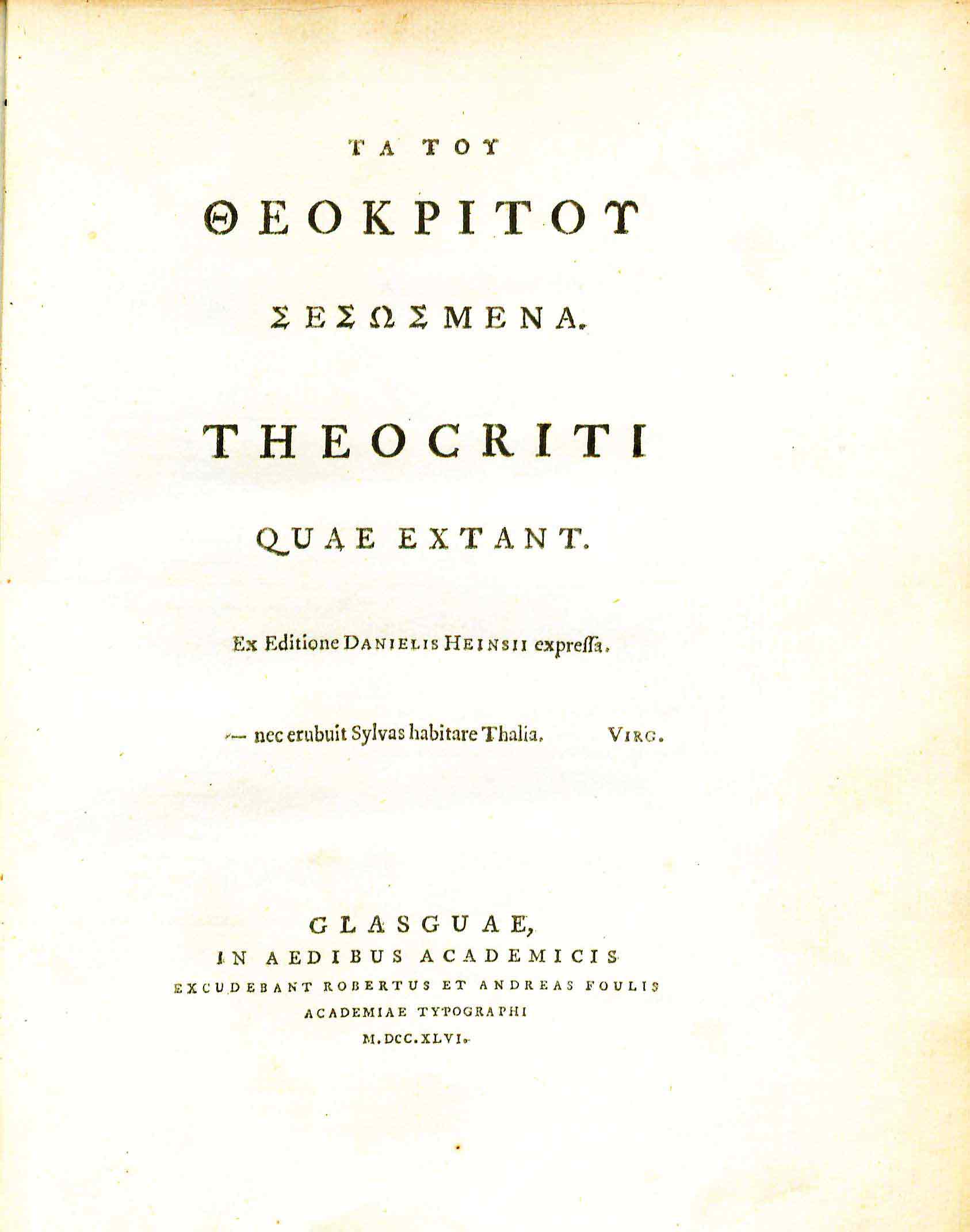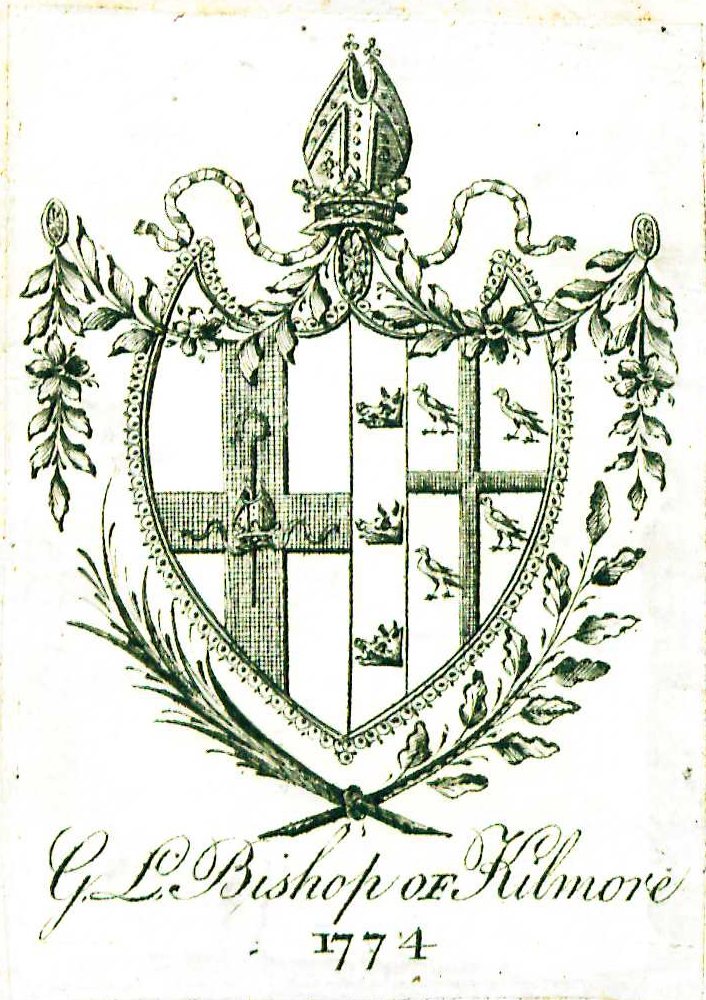Difference between revisions of "Ta tou Theokritou Sesomena"
| Line 18: | Line 18: | ||
|display=left | |display=left | ||
|caption=Bookplate of G. L., Bishop of Kilmore, front pastedown. | |caption=Bookplate of G. L., Bishop of Kilmore, front pastedown. | ||
| − | }}[http://en.wikipedia.org/wiki/Theocritus Theocritus] was a Hellenistic Greek poet who lived in the first half of the third century BCE in Syracuse on the island of Sicily.<ref>[http://www.oxfordreference.com/view/10.1093/acref/9780199548545.001.0001/acref-9780199548545-e-2903 "Theo'critus”] in ''The Oxford Companion to Classical Literature'', ed. by M.C. Howatson (Oxford: Oxford University Press, 2011).</ref> It is possible that Theocritus lived in south Italy for part of his life and | + | }}[http://en.wikipedia.org/wiki/Theocritus Theocritus] was a Hellenistic Greek poet who lived in the first half of the third century BCE in Syracuse on the island of Sicily.<ref>[http://www.oxfordreference.com/view/10.1093/acref/9780199548545.001.0001/acref-9780199548545-e-2903 "Theo'critus”] in ''The Oxford Companion to Classical Literature'', ed. by M.C. Howatson (Oxford: Oxford University Press, 2011).</ref> It is possible that Theocritus lived in south Italy for part of his life, and that he visited Alexandria, Egypt during the reign of Ptolemy II Philadelphus.<ref>Ibid.</ref> Several of Theocritus’ poems are set in Alexandria and directly reference Ptolemy’s palace and life under his rule, specifically poems 15 and 17.<ref>[http://www.oxfordreference.com/view/10.1093/acref/9780192801463.001.0001/acref-9780192801463-e-2159 "Theocritus"] in ''Oxford Dictionary of the Classical World'', ed. by John Roberts (Oxford: Oxford University Press, 2007).</ref><br /> |
| + | <br /> | ||
| + | Theocritus invented the genre of pastoral or bucolic poetry that focused on artfully simplistic depictions of herdsmen singing of “themselves, their loves and quarrels.”<ref>[http://www.oxfordreference.com/view/10.1093/acref/9780199548545.001.0001/acref-9780199548545-e-2257 "pastoral poetry”] in ''The Oxford Companion to Classical Literature'', ed. by M.C. Howatson (Oxford: Oxford University Press, 2011).</ref> Due to the relatively limited subject matter, bucolic poetry became used for allegorical comments on society and politics around the time of Virgil.<ref>Ibid.</ref> Theocritus’ extant works include thirty poems, several fragments of poems, and twenty-four epigrams, though the authenticity of all of them is doubtful.<ref>"Theocritus" in ''Oxford Dictionary of the Classical World''.</ref> | ||
==Evidence for Inclusion in Wythe's Library== | ==Evidence for Inclusion in Wythe's Library== | ||
| − | Listed in the [[Jefferson Inventory]] of [[Wythe's Library]] as ''Theocritus Gr. Lat. 4to. Foul.'' and given by [[Thomas Jefferson]] to his grandson [[Thomas Jefferson Randolph]]. Both [http://www.librarything.com/profile/GeorgeWythe George Wythe's Library]<ref>''LibraryThing'', s. v. "Member: George Wythe," accessed on November 13, 2013, http://www.librarything.com/profile/GeorgeWythe </ref> on LibraryThing and the [https://digitalarchive.wm.edu/handle/10288/13433 Brown Bibliography]<ref> Bennie Brown, "The Library of George Wythe of Williamsburg and Richmond," (unpublished manuscript, May, 2012) Microsoft Word file. Earlier edition available at: https://digitalarchive.wm.edu/handle/10288/13433</ref> list the 1746 edition published by Foulis and this is the edition the Wolf Law Library purchased. | + | Listed in the [[Jefferson Inventory]] of [[Wythe's Library]] as ''Theocritus Gr. Lat. 4to. Foul.'' and given by [[Thomas Jefferson]] to his grandson [[Thomas Jefferson Randolph]]. Both [http://www.librarything.com/profile/GeorgeWythe George Wythe's Library]<ref>''LibraryThing'', s. v. "Member: George Wythe," accessed on November 13, 2013, http://www.librarything.com/profile/GeorgeWythe </ref> on LibraryThing and the [https://digitalarchive.wm.edu/handle/10288/13433 Brown Bibliography]<ref> Bennie Brown, "The Library of George Wythe of Williamsburg and Richmond," (unpublished manuscript, May, 2012) Microsoft Word file. Earlier edition available at: https://digitalarchive.wm.edu/handle/10288/13433</ref> list the 1746 edition published by Foulis, and this is the edition the Wolf Law Library purchased. |
==Description of the Wolf Law Library's copy== | ==Description of the Wolf Law Library's copy== | ||
Revision as of 14:34, 14 March 2014
by Theocritus
| Ta tou Theokritou Sesomena = Theocriti Quae Extant | |
|
Title page from Ta tou Theokritou Sesomena = Theocriti Quae Extant, George Wythe Collection, Wolf Law Library, College of William & Mary. | |
| Author | Theocritus |
| Published | Glasguae: In aedibus academicis excudebant Robertus et Andreas Foulis |
| Date | 1746 |
| Language | Greek |
Theocritus was a Hellenistic Greek poet who lived in the first half of the third century BCE in Syracuse on the island of Sicily.[1] It is possible that Theocritus lived in south Italy for part of his life, and that he visited Alexandria, Egypt during the reign of Ptolemy II Philadelphus.[2] Several of Theocritus’ poems are set in Alexandria and directly reference Ptolemy’s palace and life under his rule, specifically poems 15 and 17.[3]
Theocritus invented the genre of pastoral or bucolic poetry that focused on artfully simplistic depictions of herdsmen singing of “themselves, their loves and quarrels.”[4] Due to the relatively limited subject matter, bucolic poetry became used for allegorical comments on society and politics around the time of Virgil.[5] Theocritus’ extant works include thirty poems, several fragments of poems, and twenty-four epigrams, though the authenticity of all of them is doubtful.[6]
Evidence for Inclusion in Wythe's Library
Listed in the Jefferson Inventory of Wythe's Library as Theocritus Gr. Lat. 4to. Foul. and given by Thomas Jefferson to his grandson Thomas Jefferson Randolph. Both George Wythe's Library[7] on LibraryThing and the Brown Bibliography[8] list the 1746 edition published by Foulis, and this is the edition the Wolf Law Library purchased.
Description of the Wolf Law Library's copy
Small quarto bound in contemporary calf, rebacked to style, black calf label. Contains the engraved armorial bookplate of the G. L., Bishop of Kilmore, dated 1774 on the front pastedown. Former owner signatures of "W. Ross King, 1842" and "Angela Cambitzi, 1942" are on the front free endpaper. Purchased from Michael R. Thompson Books.
View this book in William & Mary's online catalog.
References
- Jump up ↑ "Theo'critus” in The Oxford Companion to Classical Literature, ed. by M.C. Howatson (Oxford: Oxford University Press, 2011).
- Jump up ↑ Ibid.
- Jump up ↑ "Theocritus" in Oxford Dictionary of the Classical World, ed. by John Roberts (Oxford: Oxford University Press, 2007).
- Jump up ↑ "pastoral poetry” in The Oxford Companion to Classical Literature, ed. by M.C. Howatson (Oxford: Oxford University Press, 2011).
- Jump up ↑ Ibid.
- Jump up ↑ "Theocritus" in Oxford Dictionary of the Classical World.
- Jump up ↑ LibraryThing, s. v. "Member: George Wythe," accessed on November 13, 2013, http://www.librarything.com/profile/GeorgeWythe
- Jump up ↑ Bennie Brown, "The Library of George Wythe of Williamsburg and Richmond," (unpublished manuscript, May, 2012) Microsoft Word file. Earlier edition available at: https://digitalarchive.wm.edu/handle/10288/13433


